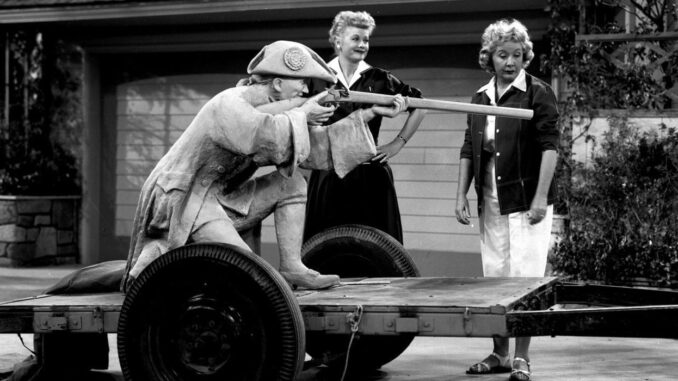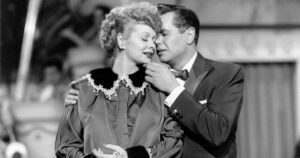
Introduction: Why the Curtain Closed on a Classic Without a Goodbye
Imagine tuning in to your favorite show week after week, only to find it suddenly gone without explanation. That’s exactly what happened to millions of fans when I Love Lucy, one of the most beloved sitcoms of all time, ended its groundbreaking run. But why did it vanish without a proper sendoff? The story behind its abrupt conclusion is as fascinating as the show itself, involving personal struggles, shifting dynamics, and changing television trends. Let’s dive into the behind-the-scenes drama that left fans puzzled and longing for closure.
The Golden Era of I Love Lucy
How Lucy and Desi Redefined TV
In the early 1950s, television was still finding its voice, and I Love Lucy was a revelation. Lucille Ball and Desi Arnaz created a formula that was fresh, funny, and relatable. With physical comedy, witty banter, and unforgettable characters, the show revolutionized the sitcom genre.
An Unstoppable Ratings Juggernaut
At its peak, I Love Lucy was the highest-rated show in the country, drawing in over 60 million viewers. It wasn’t just popular—it was a cultural phenomenon. Families gathered around their TVs to watch Lucy’s hilarious antics, and the show became an integral part of American life.
The Personal Toll on Lucille Ball and Desi Arnaz
Behind the Laughter: A Strained Marriage
While Lucy and Ricky Ricardo were the epitome of comedic harmony, Lucille Ball and Desi Arnaz’s marriage was under immense strain. The pressures of running a production company, raising children, and maintaining a public image took their toll. By the mid-1950s, cracks in their relationship were hard to ignore.
Balancing Stardom and Personal Life
Lucille and Desi weren’t just co-stars; they were business partners. Desilu Productions was thriving, but the demands of managing a production empire while starring in a weekly sitcom left little room for personal connection.

The Shift to The Lucille Ball-Desi Arnaz Show
Why the Transition Happened
After six successful seasons, Ball and Arnaz decided to pivot from the traditional sitcom format. They transitioned to hour-long specials under the banner of The Lucille Ball-Desi Arnaz Show, also known as The Lucy-Desi Comedy Hour.
The Industry’s Changing Landscape
The television industry was evolving. Longer formats and anthology-style series were gaining popularity, and the couple wanted to explore new creative opportunities. The decision to shift formats signaled the end of I Love Lucy as fans knew it.
Why There Was No Final Episode
The Lack of a Farewell Episode
Unlike today’s serialized storytelling, most shows in the 1950s didn’t provide closure. Sitcoms were episodic, and the idea of a series finale wasn’t standard practice. For I Love Lucy, the decision to move on was gradual, not abrupt—at least for the creators.
A Quiet Goodbye
The final episode of I Love Lucy aired on May 6, 1957, without any announcement that it was the end. Fans had no idea they were watching the last installment of a cultural juggernaut.
The Impact of the Abrupt Ending
Fans Left Wanting More
Without a definitive conclusion, viewers were left with a sense of incompletion. What happened to Lucy, Ricky, Fred, and Ethel? Fans could only imagine.
Legacy of Unfinished Business
Even without a finale, I Love Lucy left an indelible mark on pop culture. The characters lived on in reruns, ensuring their story never truly ended.
The Lasting Influence of I Love Lucy
Reruns and Syndication
The show found new life in reruns, introducing generations of fans to Lucy’s iconic misadventures. It remains one of the most syndicated shows in television history.
A Blueprint for Sitcoms
From its pioneering use of a live studio audience to its multi-camera setup, I Love Lucy set the standard for sitcoms. Its influence is still felt in modern television.
Was It All for the Best?
Preserving the Show’s Quality
By ending without a decline in quality, I Love Lucy avoided the pitfalls of overstaying its welcome. Fans remember it as a near-perfect comedy series.
A Bittersweet Legacy
While the lack of a finale left a void, it also solidified the show’s legendary status. Sometimes, it’s better to leave the party while it’s still in full swing.
Conclusion: A Legacy Without an Ending
I Love Lucy may have ended abruptly, but its legacy is anything but incomplete. The laughter, the love, and the groundbreaking innovation it brought to television continue to resonate. While fans never got the closure they hoped for, perhaps that’s part of the magic. Lucy and Ricky will always live on in our memories, perpetually young, funny, and full of life.
FAQs
1. Why didn’t I Love Lucy have a proper finale?
The concept of a series finale wasn’t common in the 1950s. The show transitioned to hour-long specials without officially ending.
2. Did Lucille Ball and Desi Arnaz’s personal life affect the show’s ending?
Yes, their strained marriage contributed to the decision to end the series and shift to a different format.
3. How successful was I Love Lucy during its original run?
It was immensely successful, consistently topping ratings and becoming a cultural phenomenon.
4. Is I Love Lucy still relevant today?
Absolutely. Its timeless humor, innovative production, and lovable characters make it a staple of classic television.
5. What happened to the cast after the show ended?
Lucille Ball and Desi Arnaz continued working in television, with Ball achieving further success in other sitcoms like The Lucy Show.